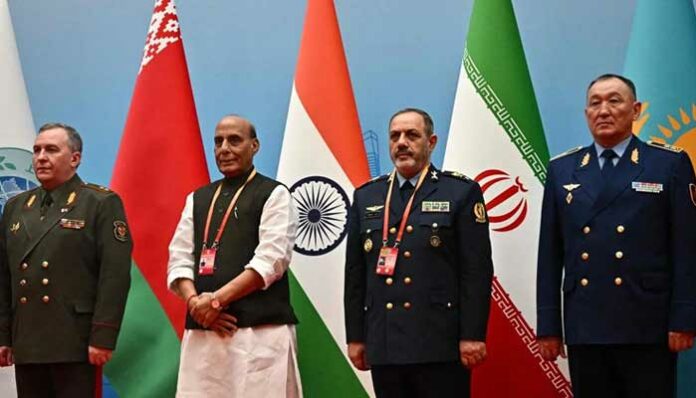India Backs Out of Sign SCO Deal Over Dispute
Tensions rose during the Shanghai Cooperation Organisation (SCO) Defence Ministers’ meeting in Qingdao on Thursday. During the session, India decided not to support the joint statement. This decision came after the group dismissed India’s accusations linking Pakistan to the Pahalgam attack. The disagreement highlighted ongoing regional challenges within the SCO. It was a clear moment showing why some members hesitate to fully sign SCO agreements.
Khawaja Asif, the Defence Minister of Pakistan, attended the meeting to speak for Islamabad. This was the first time since Marka-e-Haq that top officials from both Pakistan and India joined the same event. It was a notable occasion bringing the two countries’ leaders together. This meeting marked an important step for leaders willing to sign SCO initiatives despite difficulties.
At the recent SCO Defence Ministers’ meeting, India’s Defence Minister Rajnath Singh did not approve the joint statement. This was mainly because the statement left out any mention of the recent Pahalgam incident in Indian Illegally Occupied Jammu and Kashmir (IIOJK). His decision highlighted India’s concerns over how the event was addressed. India’s choice showed that not all members are ready to sign SCO decisions without reservations.
Because India did not agree, the group of ten nations was unable to release a joint statement. This affected the outcome of their discussions significantly.
According to ANI, which talks to government sources, New Delhi disagreed with the draft statement. The draft criticized India for attacks in Balochistan without directly saying so, but it didn’t mention the Pahalgam attack at all. This disagreement reflects ongoing tensions that influence whether India will sign SCO documents in the future.
How Sign SCO Issues Are Affecting the Region and Diplomacy
Many analysts view this as a new diplomatic setback for India. Experts consider this a fresh diplomatic loss for India because the SCO did not agree with India’s false claims about Pakistan’s role in the Pahalgam attack. This situation highlights ongoing tensions in regional diplomacy.
The Shanghai Cooperation Organization (SCO) recently showed support for Iran and strongly criticized the Israeli airstrikes on Iranian land. This message of unity came from all the member countries during a time of rising tension in the region. The SCO stressed the importance of avoiding actions that could make the situation worse in the Middle East. They also called for peace, respect for each country’s borders, and efforts to keep the region stable.
India decided not to support the final message shared by the group. This decision came because India was unhappy with certain parts of the statement. They felt it did not include important concerns they had. As a result, they chose to distance themselves from the group’s joint message. This shows that some strong disagreements still exist between the member countries.
The Shanghai Cooperation Organisation (SCO) brings together ten countries, including Russia, Pakistan, and India, to work on regional matters. Recently, the Sign SCO strongly condemned the Israeli military strikes that happened on June 13, which targeted several places inside Iran. This statement showed the group’s support for Iran and concern about the rising tensions in the region.
Countries in the group agreed to follow the United Nations’ rules and said they will not support any illegal acts against other member nations.
The rising tensions in the Middle East have drawn significant attention from various countries. Despite concerns about the situation, the shared statement by the Sign SCO members was not fully supported by all. Some nations chose to keep their own independent views on the matter. This shows the delicate balance countries try to maintain between their alliances and national interests.
It also reflects how complicated global politics can be when dealing with ongoing conflicts. Many are seeking ways to manage these issues while protecting their own priorities. The situation highlights the challenges in reaching a unified international response.
For authentic news and the latest updates, stay connected with: DumdaarPoint.com

